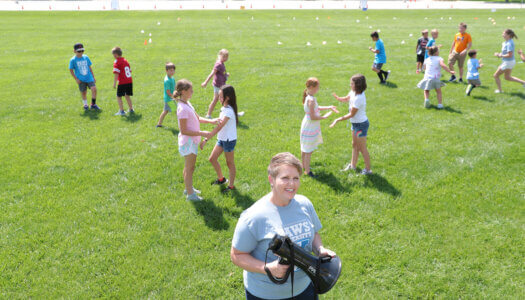
VIEW THE 2022 NEW FRONTIERS MAGAZINE FEATURING NEBESNIAK AND OTHER UNK FACULTY
By JAN TREFFER THOMPSON
KEARNEY – Amy Nebesniak’s math career started with one “amazing” eighth grade teacher.
“Looking back, it wasn’t the math I was drawn to, it was the way she made me feel. She made you want to be in class. She made you feel you could do this, no matter what,” Nebesniak said. “I knew ‘This is what I want to do. I want to be like her.’ My heart was pulled to teaching right then.”
Now an associate professor of mathematics, Nebesniak doesn’t just teach math. She creates spaces where learning can happen.
Since coming to the University of Nebraska at Kearney in 2013, Nebesniak has promoted a student-centered approach in her research and classrooms and as a consultant for area schools. She leads a summer enrichment camp for elementary students and helped re-vision the UNK Honors Program as its associate director.
“When I see that we’re missing a group who could be learning or missing an opportunity for someone to improve themselves by learning, my mind immediately goes, ‘How can we fix that? What can we do?’” she said.

PAWS UNIVERSITY
Each summer, hundreds of elementary students explore their interests on the UNK campus through workshops about everything from Pokémon to performing arts. PAWS University helps students avoid a “summer slide” in academics and introduces them to the university.
Nebesniak has directed the camp since it came to UNK from Kearney Public Schools in 2019. She oversees everything, from securing grants to reviewing workshop proposals and lesson plans.
While PAWS classes have always been engaging and hands-on, she said the move to UNK brought a “campus connection” to every workshop. Faculty meet with students, give presentations and lead tours of their research space.
Nebesniak recalled talking to one student after a professor described researching owls.
“That kid was like, ‘You can spend your whole life on owl wings?’ They don’t even know these possibilities are out there,” Nebesniak said. “They can’t dream about something they don’t know about.”
This year’s camp averaged 300 children per day, up 25% from last year.
“In the first three hours (registration) was open, we had more students register than we had attend our first summer of camp,” she said. “We had some parents post online that ‘I felt like I was waiting to get tickets to a concert.’”
Nebesniak has plenty of ideas for expanding PAWS but knows she can only take the program so far.
“There’s a lot of struggles with ‘How do I still do this well without giving up my actual true love of teaching teachers?’” she said.
In her classes, Nebesniak models the collaborative, problem-solving atmosphere she hopes her students will create in their own classrooms. She asks questions rather than lecture and welcomes student input and new ways to present information.
“You can teach all the math you want, but if the kids don’t remember it, what’s the point?” she tells the future teachers, explaining that it’s more important for students to understand why a math problem gets solved, rather than remembering the “right way” to solve it.

MISS BONKERS
One of Nebesniak’s teaching aids is the book “Hooray for Diffendoofer Day.” In it, a teacher, Miss Bonkers, has unconventional methods that leave students worried about an end-of-the-year standardized test. Miss Bonkers tells them they’ll do fine, because even though they weren’t doing exercises from a textbook, they were learning to think.
“That’s what I’m trying to do. Teach them how to think. And as preservice teachers, it’s not just their thinking but … how to help their students think; how to pass that on and not be rote little machines, because our world does not need rote machines.”
Nebesniak has also impacted UNK’s honors students. She and director Angela Hollman have revised the program and the key change, Nebesniak said, was replacing a research requirement with a sophomore-year pathway project students can tailor to their own interests.
“It’s about intellectual curiosity, going above and beyond, and that looks different for every person,” she said. “They’ve never had that space before.”
Space. Opportunity. Freedom to think and learn in ways that make sense. Nebesniak wants as many students as possible to experience that.
“I know this is cliché. I really believe education is the cornerstone of everything. It is how we progress as a society. It is how we progress personally, learning and growing, and to know some kids don’t have that path already placed in front of them. … I want them to see that path.”
PHOTOS BY ERIKA PRITCHARD, UNK COMMUNICATIONS

Title: Associate Professor of Mathematics and Statistics, Associate Director of Honors Program, Director of PAWS University
College: Arts and Sciences
Education: Ed.D. in teaching, learning and teacher education, University of Nebraska-Lincoln, 2012; Master of Arts in teaching, learning and teacher education with mathematics minor, University of Nebraska-Lincoln, 2007; Bachelor of Science in education, University of Nebraska at Kearney, 2002.
Years at UNK: Nine
Areas of research/specialization: Teaching Mathematics with Reasoning and Sense Making; Professional Development of Mathematics Teachers (In-Service and Pre-service), Instructional Coaching; Growth Mindset; Collaboration Efforts Between Universities and K-12 School District Partners.
Courses taught: Math for Elementary Teachers I, Math for Elementary Teachers II, Middle School Mathematics, Methods in Middle and High School Mathematics Teaching, College Algebra, Intermediate Algebra, Best Practices in Mathematics Teaching: UNK/KPS Mathematics Implementation Collaboration, Current Research in Mathematics Education, Using Mathematics to Understand Our World.
Recent publications: “Positive College Perception: The Impact of a Curriculum-Based Summer Camp’s Transition,” Journal for Leadership and Instruction, In Press; “District-University Collaborations to Support Reform-Based Mathematics Curriculum,” Journal of Mathematics Education at Teachers College, 2019.
Publications in progress: “Growth Mindsets and Achievement of Academically At-Risk Students and Preservice Teachers,” “Influence of Curriculum-Based Camps During COVID-19,” “The Impact of Professional Development Partnerships on Elementary Math Teacher Beliefs and Practices During Curriculum Change.”





